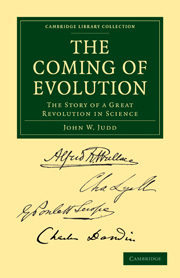Book contents
- Frontmatter
- Contents
- CHAP. I Introductory
- CHAP. II Origin of the Idea of Evolution
- CHAP. III The Development of the Idea of Evolution to the Inorganic World
- CHAP. IV The Triumph of Catastrophism over Evolution
- CHAP. V The Revolt Scrope and Lyell against Catastrophism
- CHAP. VI The Principles of Geology
- CHAP. VII The Influence of Lyell's Works
- CHAP. VIII Early Attempts to establish the Doctrine of Evolution for the Organic World
- CHAP. IX Darwin and Wallace: The Theory of Natural Selection
- CHAP. X The Origin of Species
- CHAP. XI The Influence of Drawin's Works
- CHAP. XII The Place of Lyell and Darwin in History
- Notes
- Index
- Plate section
CHAP. V - The Revolt Scrope and Lyell against Catastrophism
Published online by Cambridge University Press: 07 September 2010
- Frontmatter
- Contents
- CHAP. I Introductory
- CHAP. II Origin of the Idea of Evolution
- CHAP. III The Development of the Idea of Evolution to the Inorganic World
- CHAP. IV The Triumph of Catastrophism over Evolution
- CHAP. V The Revolt Scrope and Lyell against Catastrophism
- CHAP. VI The Principles of Geology
- CHAP. VII The Influence of Lyell's Works
- CHAP. VIII Early Attempts to establish the Doctrine of Evolution for the Organic World
- CHAP. IX Darwin and Wallace: The Theory of Natural Selection
- CHAP. X The Origin of Species
- CHAP. XI The Influence of Drawin's Works
- CHAP. XII The Place of Lyell and Darwin in History
- Notes
- Index
- Plate section
Summary
The year 1797, in which the illustrious Hutton died, leaving behind him the noble fragments of a monumental work, was signalised by the birth of two men, who were destined to bring about the overthrow of Catastrophism, and to establish, upon the firm foundation of reasoned observation, the despised doctrine of Uniformitarianism or Evolution—as outlined by Generelli, Desmarest and Hutton. These two men were George Poulett Thomson (who afterwards took the name of Scrope) and Charles Lyell. Both of them were, from their youth upwards, brought under the strongest influences of the prevalent anti-evolutionary teachings; but both emancipated themselves from the effects of these teachings, being led gradually by their geological travels and observations, not only to reject their early faith, but to become the champions of Evolution.
There was a singular parallel between the early careers of these two men. Both were the sons of parents of ample means, and were thus freed from the distractions of a business or profession, while throughout life they alike remained exempt from family cares. Each of them received the ordinary education of the English upper classes—Scrope at Harrow, and Lyell at Salisbury, in a school conducted by a Winchester master on public-school lines. In due course, the two young men proceeded to the University—Scrope to Cambridge, to come under the influence of the sagacious and eloquent Sedgwick, and Lyell to Oxford, to catch inspiration from the enthusiastic but eccentric Buckland.
- Type
- Chapter
- Information
- The Coming of EvolutionThe Story of a Great Revolution in Science, pp. 33 - 54Publisher: Cambridge University PressPrint publication year: 2009First published in: 1910



